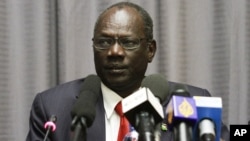South Sudan’s Information Minister Michael Makuei on Monday warned journalists that the government will take them to court and jail them if they make mistakes in their reporting.
"Up to now, we have not taken any journalist to court but we will do so," Makuei said at an event marking World Press Freedom Day. "We do so because they are being taken to the court all over the world. It is only in South Sudan where we have not taken anybody up to now."
The safety of journalists and freedom of expression were two of the focuses of World Press Freedom Day in South Sudan. The international day was proclaimed by the U.N. General Assembly in 1993 in response to a declaration signed by African journalists at a conference in Namibia two years earlier, calling for a free, independent, pluralistic media worldwide.
Government censorship
Media outlets in South Sudan say government security agents regularly censor the media and intimidate reporters.
The chair of the South Sudan’s Editors’ Forum, Koang Pal, said journalists would prefer defending themselves in court to the harassment and detention they have to endure now.
"We want him to take us to court," Pal said, referring to Makuei. "We are not afraid. If we step on the toes of others, as he always says, let us go to court and let the law judge us.”
Makuei last year warned journalists not to broadcast or publish interviews with rebel leaders inside South Sudan, saying it would constitute "subversive activity" and put the journalist on the wrong side of the law. He told VOA at the time, "If you step on the toes of others, you are in violation of the law. The toes of others here include the state. The state is a person."
Makuei said the government feels some journalists are not abiding by their profession’s code of ethics. Journalists argue that those ethics include reporting both sides of a story, which would involve speaking with the armed opposition in South Sudan's 17-month-old conflict. But many newspapers have had their print runs confiscated, and radio stations have been silenced because a story has fallen afoul of the government -- usually because it included the rebels' side.
South Sudan fell six places in this year’s World Press Freedom Index, to 125th out of 180 nations. Reporters without Borders, which released the Index in February, says media freedom in South Sudan was "suspended" when fighting broke out in December 2013.




